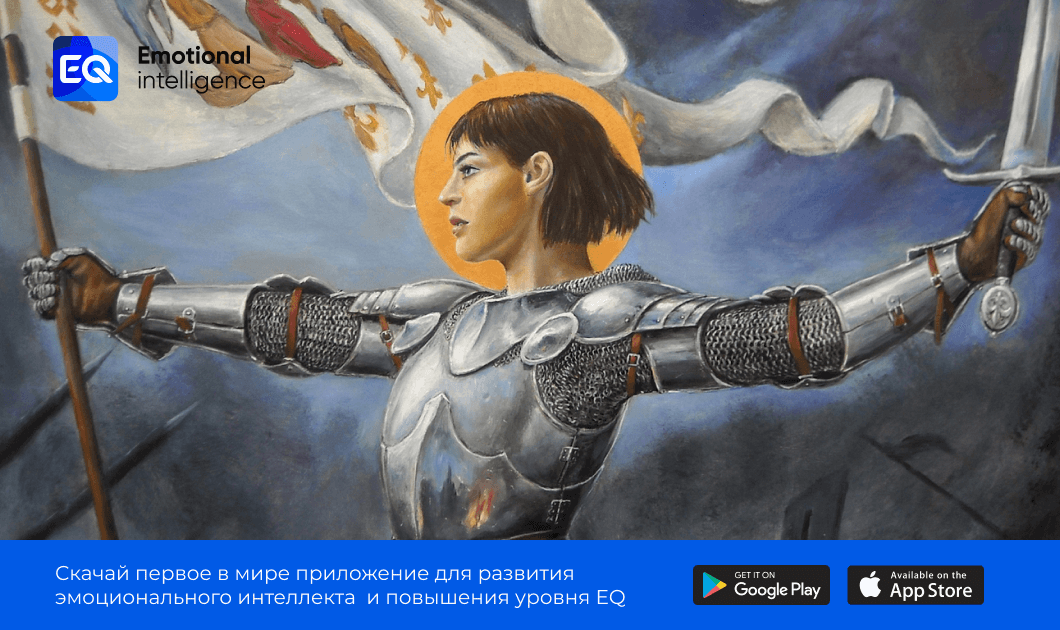Jeanne d’Arc (1412-1431), she is called the Maid of Orleans, the savior of France, an immortal symbol of patriotism and strength. She commanded French troops at the age of 17, was taken prisoner, convicted of heresy and burned at the stake.
After her death, her good name was restored, and previous charges were dropped. In the twentieth century, it was included in the canon of saints.
Jeanne’s childhood took place in a village in northeastern France. Peasant children grew up very quickly. So Jeanne at a very young age learned everything that adults do in order to survive at that time, to wash, clean, sew, weave, spin, cook and much more. Those were the times of the Middle Ages. The girl understood, looking at her parents, that the future does not bode well, except for hopeless survival through hard work, at the end of which is death in poverty. Such an environment has nurtured determination and desperation in the girl for her goals. She did not want to submit to fate, so her goal was a fanatical desire to change something in a state in which an eternal war and struggle for power was waged.
At the age of 16, she dared to share her thoughts with those in power and visited the royal steward, where she was greeted with derision of being a poor and uneducated peasant woman, she had no chance of being heard. Upon returning home, her parents decide to marry her off, but Jeanne broke off the engagement and decided to start looking for a response in the hearts of the royal courtiers again.
Struck by the girl’s persistence, endurance and confidence, skill in handling weapons, horse riding and excellent knowledge of games common among the nobility, this time the girl was accepted. She was interrogated and messengers were sent to reconnaissance to identify her identity, but they could not find anything that tarnished the reputation of this young and courageous patriot. Jeanne was interrogated by noble theologians, they asked many questions and received prudent and wise answers. They, too, did not find anything wrong in her, and even dared to admit that there was something divine in her.
Calmly and confidently, Jeanne Dark convinced the entire royal court that she would cope with the military task of liberating Orleans, a city besieged by the British. Jeanne was entrusted to lead the army.
The sun was already setting, and the French soldiers continued to fight until they were very successful. The young girl got on her horse and galloped away into the field. Away from prying eyes. Jeanne had to catch her breath. This is a very difficult moment for a young warrior. But the girl managed to pull herself together. She plunged into prayer, somewhere in the middle of a vineyard. Jeanne managed to escape from the unthinkable tension and responsibility, from that defeatist despondency that she saw in the eyes of her exhausted soldiers.
Jeanne Dark took all her will into her hands and brought the matter to the end, in 9 days Orleans was free. And Jeanne is the national hero of France – the Virgin of Orleans.
Jeanne was ready to continue to fight for France, but all the time she ran into a quiet boycott of the royal nobility. In one of the military campaigns, she was taken prisoner. King Charles, although he owed so much to this warrior, did not take any action to free her. She was held in a cell chained with an iron chain, occasionally summoned for long, grueling interrogations from one hundred and thirty-two members of the tribunal. Jeanne’s emotional stamina could only be envied. Over the course of two days, the charges were read to her, drawn up in seventy articles, but she confidently and courageously challenged one after another, each time leaving the prosecutor on the losing side. In the hope of still breaking the will of Joan of Arc, she was insulted and threatened with torture, but in vain.
Once she was brought to the cemetery, accompanied by an executioner, trying to cause fear of death, and promising better conditions for imprisonment that if she signs a paper on renunciation of heresies and obeys the church. Jeanne agrees to obey. But since the girl did not know how to read and write, this paper was replaced by another, which described all her heresies, which meant execution.
At the last interrogation, Jeanne appeared in the form of a shocked warrior, who fell under the pressure of despair, contempt for herself, through fear of death. She was perfectly aware of what was happening, although she was emotionally shocked. With the inscription on her headdress “Heretic, idolater, apostate,” she was led to the fire.
19-year-old Jeanne d’arc has forever become a symbol of the national heroine.
For 17 years she was an unknown girl from Domremi. In one year, she managed to become the savior of France. For another year, she bravely and unshakably held the blows in captivity. Being illiterate, she showed the world her emotional savvy, striving for patriotic lofty goals and became an example of courage and strength for many centuries.


Recent Comments